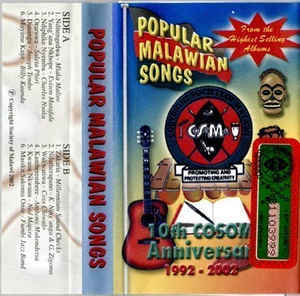
Zomba, 2000: The universe had just witnessed the birth of a new millennium. The coming in of this new age signified different things to people.
Some anticipated the end of the world, there was the saying that the internet would crush down as well.
Some futurists had predicted a radical change in culture, politics and human relations in general. And then 9/11 happened a year later, giving birth to the kind of world we are now.
But let us come down to Malawi and see how our music faired as we entered the new millennium. The year 2000 is engulfed in between 1995 – 2005, a period that I personally call the golden age of music in Malawi. With the coming in of different radio stations and the selling of music that artists benefitted from, these ten years brought rewards to the industry than the other years.

By then Balaka reggae was dominating the sound of music in Malawi. But it was facing the challenge from Chileka with the coming of the late Evison Matafale. The challenge would later prove to be real as it ended Balaka as the music mecca of Malawi. But aside this battle of titans, a new band was born in Zomba. The unfortunate part of the story is that it did not stay long on the scene.
Zomba has the reputation of producing some of the best artists in Malawi although in itself it has never been considered as a place of music. From Maulidi and his Songani band to the controversial Limbani Dube, all these were made from the Old Capital. Besides them, Zomba and Malawi witnessed the coming of the Millennium Soundchecks band with their ‘Gule wa Kwathu’ album in 2000.
The album proved to be a success and made money and fame for the band. Two notable songs from the album were ‘Ngalombere che Dokotala’ and ‘Zakaria’. These dominated the airwaves and gave Zomba a serious case on the music landscape in Malawi: It was ready to be counted as one of the homes of music in Malawi.
The album was recorded at Studio K by Dean Khoza, one member of the Khoza music dynasty. The family owned Studio K, one of the then best alternatives to IY Studios owned by Paul Banda. Studio K used to work with big artists like Charles Nsaku, Allan Ngumuya and Coss Chiwalo. It was therefore an easy choice for the band and their decision paid well.
The band was not made up of already known musicians. It was a nursery in itself, although it did not later produce any big name artists. It comprised of Mphatso Chiwaya, who was on the Lead Guitar, Steve Maere on the Bass Guitar, John Chidule, Afiki Bamusi and Kulinji Mbanga on the Keyboards, Hassan Phensulo on the Drums and Barnet Mabvuto, Elineti Shalla and Mirriam Mkwaya on the backing vocals.
These were the men and women who created the sensation called Millennium Soundchecks. Looking from the names, they were not well known people. More to that, no one from the above names made a name for himself / herself after the band disbanded. The real answer to why this was the case rests with each one of them. But normally, when there is disbanding, one or two uses the experience to create a solo career. This has been the experience with most bands in Malawi.
Still, before worrying about the quick exit from the scene, we need to celebrate their achievement. They came out of nowhere and gave Malawi a feel of what happens when unknown artists organizes themselves and come up with an album. Sixteen years later, one can hardly hear their music on the radio. In a fast music industry like that of Malawi, it is easy for one to get trampled upon and be forgotten, especially when not making new songs.
About the writer: Wonderful Mkhutche is a speech writer, a political scientist and a manuscript editor and developer.















This group are they steal performing in music industry ?they do nice music